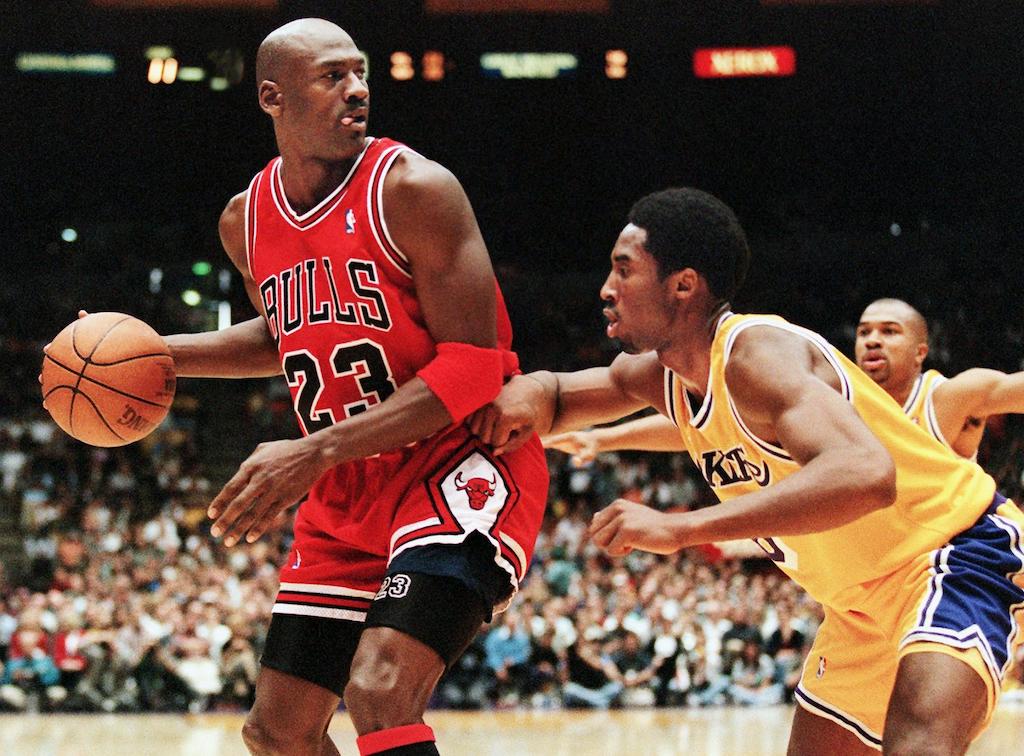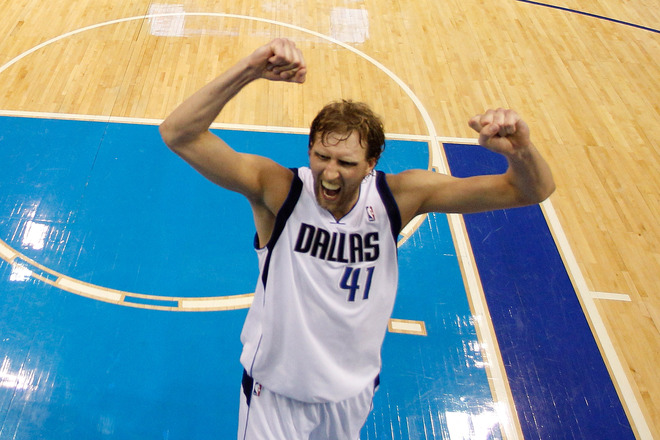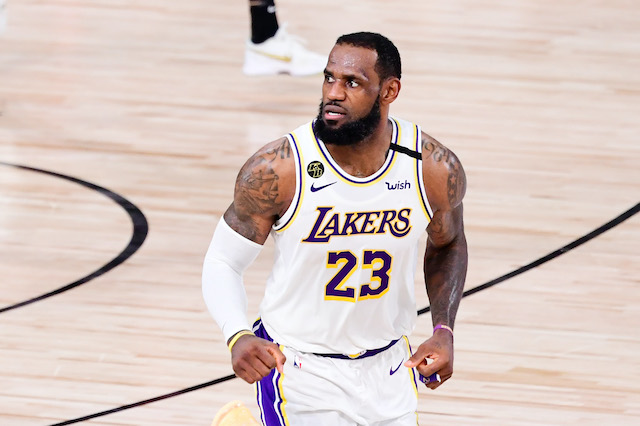
The NBA honored its 75 greatest players — 76 to be exact because of a tie — on Feb. 20, 2022, in Cleveland, Ohio. LeBron James was one of 45 members of the all-time 75 team who came in person and participated in the festivities.
For LeBron, being a part of an event to honor basketball’s greatest fraternity was like seeing the posters on his bedroom wall come to life. “To see those guys and then be on stage with those guys — it’s just crazy,” he said.
Bill Russell was one of the living legends who were honored in Cleveland. Russell won 11 championships in 13 years with the Boston Celtics. The man has more rings than fingers. Commissioner Adam Silver summed it best when he called Russell basketball’s Babe Ruth.
The NBA 75th anniversary team was selected by a blue-ribbon panel of current and former NBA players, coaches, general managers, team and league executives, WNBA legends, sportswriters, and broadcasters. Voters were asked to select the 75 greatest players in NBA history without regard to position. Panelists did not rank their selections. Current and former players were not allowed to vote for themselves.
Choosing the 75 greatest players in the history of the NBA was no easy task. For the most part, the blue-ribbon panel got it right. But there were a few notable misses.
OneManFastBreak thought it would be fun to revisit the list and rank them in order from 1 to 75, with some editing to make the list our own. The benchmarks were based on individual accomplishments, team success (with more weight placed on postseason resume and titles), how they performed against other great players in their era, overall influence and impact on the game, and legacy. But more importantly, the question we have to ask while ranking the best of the best is this: can you write the story of the first 75 years of the NBA without this player?
Here are the 75 greatest basketball players of all time, based on one man’s opinion.
1-Michael Jordan
2-Kobe Bryant
3-Kareem Abdul-Jabbar
4-Bill Russell
5-Magic Johnson
6-LeBron James
7-Shaquille O’Neal
8-Tim Duncan
9-Larry Bird
10-Stephen Curry
11-Wilt Chamberlain
12-Julius Erving
13-Hakeem Olajuwon
14-Kevin Garnett
15-Jerry West
16-Dirk Nowitzki
17-Moses Malone
18-Oscar Robertson
19-David Robinson
20-Kevin Durant
21-Dwyane Wade
22-Giannis Antetokounmpo
23-Nikola Jokic
24-John Havlicek
25-Isiah Thomas
26-Willis Reed
27-Bob Pettit
28-Scottie Pippen
29-Rick Barry
30-Bob Cousy
31-Karl Malone
32-Charles Barkley
33-Kawhi Leonard
34-Jason Kidd
35-Dave Cowens
36-Bob McAdoo
37-Bill Walton
38-Allen Iverson
39-Wes Unseld
40-John Stockton
41-Dennis Rodman
42-Clyde Drexler
43-Elgin Baylor
44-Walt Frazier
45-Elvin Hayes
46-Gary Payton
47-Kevin McHale
48-James Worthy
49-Joe Dumars*
50-George Mikan
51-James Harden
52-Russell Westbrook
53-Klay Thompson*
54-Patrick Ewing
55-Manu Ginobili*
56-Tony Parker*
57-Dwight Howard*
58-Dennis Johnson*
59-George Gervin
60-Paul Pierce
61-Nate Archibald
62-Steve Nash
63-Earl Monroe
64-Ray Allen
65-Dikembe Mutombo*
66-Sam Jones
67-Hal Greer
68-Draymond Green*
69-Billy Cunningham
70-Bernard King*
71-Alonzo Mourning*
72-Reggie Miller
73-Pete Maravich
74-Dominique Wilkins
75-Paul Arizin
* Wasn’t included in the original NBA 75th anniversary team
Honorable mention: Lenny Wilkens, Nate Thurmond, Robert Parish, Dolph Schayes, Jerry Lucas, Bill Sharman, Dave DeBusschere, Dave Bing, Artis Gilmore, Sidney Moncrief, Adrian Dantley, Dan Issel, Tim Hardaway, Mitch Richmond, Vince Carter, Tracy McGrady, Ben Wallace, Chauncey Billups, Carmelo Anthony, Anthony Davis, Yao Ming, Pau Gasol, Rudy Gobert, Chris Paul, Luka Doncic, Jayson Tatum, Jimmy Butler, Damian Lillard.
OMFB’s top-12 list is rock solid. The gap between each of them is minuscule. You won’t hear pushbacks here if Kareem Abdul-Jabbar was placed ahead of Michael Jordan, or LeBron James ahead of Kobe Bryant, or Shaquille O’Neal ahead of Magic Johnson. The order can be rearranged but the history of basketball can’t be written without mentioning Jordan, Kobe, Kareem, Bill Russell, Magic, LeBron, Shaq, Tim Duncan, Larry Bird, Wilt Chamberlain, and Julius Erving, and Stephen Curry.
Jordan is universally recognized as the Greatest of All Time — aka the GOAT. Air Jordan’s resume speaks for itself. MJ was a perfect 6-0 in the NBA Finals and named Finals MVP six times. Once he dethroned Magic in 1991, he never relinquished the crown until he retired.
Kobe is No. 2 on the OMFB list. Black Mamba was a facsimile of Air Jordan. He was the closest thing to MJ. Kobe and Mike were the same height and had the same body type. Kobe even sounded like Mike. Imitation is the greatest form of flattery. Jordan gave rare praise to his contemporaries, but he made an exception for Kobe. “He was a mentally tough kid, maybe even tougher than I was,” Jordan said of Kobe, who tragically died in a helicopter crash on Jan. 26, 2020. Jordan spawned millions of ballers who wanted to be Just Like Mike. Kobe gifted the next generation of hoopers the “Mamba Mentality.” If you’re still not convinced that Kobe deserves to be No. 2 on the all-time list, pull up the YouTube video from Jan. 22, 2006. Kobe authored arguably the greatest individual performance in NBA history when he scored 81 points in 42 minutes. Phil Jackson, who coached Michael Jordan in Chicago, was sitting on the Lakers bench for Kobe’s 81-point game. He put it in proper perspective. “It was another level,” Jackson said. “I’ve seen some remarkable games, but I’ve never seen one like that before.”
Some LeBron fans might be aghast seeing their beloved king at No. 6. But here are the cold, hard facts. LeBron lost six times in 10 trips to the NBA Finals. He has a 22-33 win-loss record in The Finals. Magic (24-26), Erving (10-12) and Wilt (16-19) are the other top-12 players who had sub-.500 records in the NBA Finals. LeBron lost to Duncan’s San Antonio Spurs twice and he could have been 0-3 against Duncan if Ray Allen hadn’t made a ridiculous late-game 3-pointer, saving the Heat’s season and forcing a Game 7. LeBron is 1-3 against Steph Curry. It’s an unfair record because Curry teamed up with Kevin Durant in 2017 and 2018 against James, but they were “Ls” on LeBron’s resume nonetheless.
LeBron’s place among basketball’s all-time greats is secure. To say he’s had a better career than Jordan, Kobe, Kareem, Magic, Russell, or even Duncan is up for debate.
Steph Curry broke into the top 10 after winning his fourth NBA title. Curry is considered the best long-range shooter in the sport, and the numbers back it up. When Steph hangs up his Under Armour sneakers, a strong case could be made that he was the most influential. Because of Steph — the NBA’s all-time leader in 3-pointers made — there’s a generation of players at various levels launching shots from beyond the arc.
OMFB made the difficult decision to remove 10 players from the league’s original top-75 list and inserted 10 new names: Joe Dumars, Dennis Johnson, Dwight Howard, Dikembe Mutombo, Klay Thompson, Tony Parker, Manu Ginobili, Bernard King, Alonzo Mourning and Draymond Green.
Dumars was a two-time NBA champ and Finals MVP in 1989. Thompson is a four-time NBA champ and arguably the second-greatest 3-point shooter we’ve ever seen. Thompson pulled off an unthinkable feat in 2017 when he scored 60 points in 29 minutes, using just 11 dribbles. Dennis Johnson earned three championship rings and was Finals MVP in 1979. Larry Bird considered DJ the best player he ever played with. Howard was a three-time Defensive Player of the Year (DPOY), carried the Orlando Magic to the NBA Finals in 2009, and won a title with the L.A. Lakers in 2020. Mount Mutombo was a four-time DPOY and pulled out the “finger wag” each time he blocked a shot.
Parker inspired a generation of new-age point guards. Aside from winning the 2007 Finals MVP, the four-time NBA champion’s biggest contribution to the game was his signature shot: the tear-drop floater. The vast majority of guards in today’s game, from high school to college to the pros, have a floater in their bag of shots. Parker’s backcourt mate in San Antonio, Ginobili, sacrificed personal statistics in order for the Spurs to win titles. Ginobili posted modest numbers throughout his career (13.3 points, 3.5 rebounds, 3.8 assists), but his 72% winning percentage ranks among the all-time best. Ginobili also introduced one of the best basketball moves in recent memory — the Eurostep.
Alonzo Mourning was a two-time Defensive Player of the Year and won a championship with the Miami Heat in 2006. Pat Riley’s famed “Heat Culture” in Miami wouldn’t exist without Zo. He embodies what Heat Culture is all about. The Heat prided itself on being the hardest-working, best-conditioned team, and that defined Mourning’s career until a rare kidney diseased robbed him of his athletic prime.
Bernard King was a scoring machine until he wrecked his knee at the peak of his powers. Armed with a smooth turnaround jumper that was nearly impossible to stop, King put on a show in the 1984 playoffs as he averaged 34.8 points and almost single-handedly led the New York Knicks to the conference semifinals.
Outside of Dennis Rodman, four-time champ Draymond Green might be the most unique player. The 2017 DPOY won’t blow you away with individual stats but he’s arguably the heart and soul of the Golden State Warriors dynasty. Green is the primary playmaker on offense as the point forward and the anchor on defense.
The first 75 years of the NBA can be broken down into six eras.
From the 1950s through the 1960s, Jerry West, Oscar Robertson, Elgin Baylor, Bob Cousy, George Mikan, Bob Pettit, Wilt Chamberlain, and Bill Russell were the pioneers.
Kareem Abdul-Jabbar, Dave Cowens, John Havlicek, Willis Reed, Wes Unseld, Rick Barry, and Julius “Dr. J” Erving carried the torch through a rough patch in the 1970s when the ABA and NBA canceled each other and the audience dwindled.
Magic and Bird revived basketball in the 1980s, arguably the league’s golden era that also included the rise of Isiah Thomas’ “Bad Boys” Detroit Pistons. Moses Malone teamed up with Dr. J during the 1982-83 season and together they co-authored one of the most dominant playoff runs, sweeping Magic’s Lakers in the ’83 Finals and capping off a 12-1 postseason.
Michael Jordan took the baton from Magic and Bird and ruled the 1990s. Jordan won six championships in eight years, pulling off the three-peat twice and denying peers Sir Charles Barkley and Karl “The Mailman” Malone from winning rings. Hakeem Olajuwon benefited from Jordan’s brief retirement, leading the Houston Rockets to back-to-back titles in 1994 and 1995. David “The Admiral” Robinson teamed up with Tim “Big Fundamental” Duncan in San Antonio, winning titles in 1999 and 2003.

The immediate post-Jordan era was dominated by five players: Kobe Bryant, Shaquille O’Neal, Kevin Garnett, Dirk Nowitzki, and Duncan. Kobe, Shaq, and Duncan combined to win 13 NBA titles, four regular season MVPs, and eight Finals MVPs from 1999 to 2010. For a decade, the road to the NBA Finals went through Kobe, Shaq, and Duncan.
Dirk and KG revolutionized the game and ushered in a new era of big men. The Big Ticket made it possible for high schoolers to skip college and turn pro at 19. Nowitzki opened the door for European bigs who preferred to face the basket instead of having their back to it. Nowitzki and Garnett were instrumental in the game’s evolution, as more and more teams shifted away from traditional power forwards and opted for stretch-4s.
Nowitzki bridged the gap between the Kobe Bryant era and the LeBron James era. Nowitzki ended Kobe’s reign as the world’s best player when Dirk’s Dallas Mavericks squad knocked off Kobe’s Lakers in the 2011 playoffs. In the same playoff run, Nowitzki put a pause on LeBron’s title hopes when his Mavs defeated LeBron’s Miami Heat in the 2011 NBA Finals.
LeBron’s appearance in the 2011 Finals started a run of eight consecutive trips. He put together a super team in Miami, winning two titles in 2012 and 2013, but lost to the Mavs in 2011 and Duncan’s Spurs in 2014. After a four-year run in South Beach, LeBron returned to Cleveland to fulfill his promise of bringing a championship to his hometown team. He delivered on the promise by winning a title in 2016, ending Cleveland’s 52-year professional title drought.

LeBron took the Cavs to four straight NBA Finals but could muster just one victory in four matchups against Steph Curry’s Golden State Warriors. Curry led the Warriors to four championships in eight seasons — two of those championship banners were aided by the addition of Kevin Durant.
The Warriors opened the portal to the “small ball” era and advanced metrics. Analytics experts preferred shooting 3s over 2s — it’s either a layup or dunk or a 3-ball — and the midrange shot was viewed as somewhat of a dinosaur idea.
The modern day NBA put a premium on pace and space. The traditional back-to-the-basket center is becoming extinct and today’s game is dominated by versatile wing players like LeBron, Durant, Kawhi Leonard, and Giannis Antetokounmpo. All of whom can anchor a defense like a center and initiate the offense like a point guard. We are now in the era of positionless basketball.
Basketball is cyclical. What may be considered old school could swing back to new school. The next generation of players will determine what the NBA will become in 25 years when we celebrate the league’s 100th anniversary.
Joel Huerto is the editor and publisher of OneManFastBreak.net. Follow him on Twitter @onemanfastbreak.